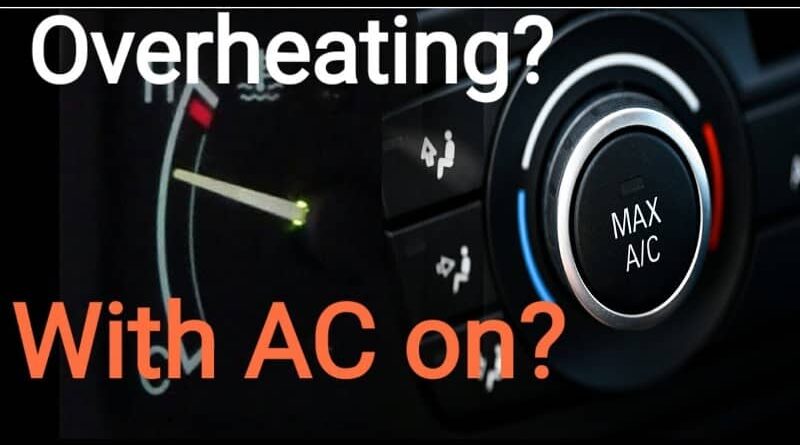
Have you ever encountered your car getting overheated while driving on a scorching summer day with the air conditioning working? It could be a risky and frustrating circumstance.
The fantastic news is that you can avoid your car from overheating while keeping your trip cool and comfy by following some simple rules.
When summer arrives and the weather gets hotter, we must use air conditioning more in our cars. It’s good to feel cool, but using the air conditioner a lot might make your car’s engine have more problems and get too hot.
You may avoid unanticipated breakdowns and expensive repairs by understanding how this occurs and how to prevent it.
Let’s learn some practical advice for avoiding the problem, “Car Overheats when the AC is On”. Even in the blazing hot summer weather, you can ensure a ride free from trouble and full of enjoyment by following some easy rules.
So let’s look at some methods to maintain your car cool and avoid overheating it when the air conditioning is on.
How Does the Cooling System in a Car Operate?
Many vital parts must cooperate to control the engine temperature in a car’s cooling system. These include several factors such as the thermostat or fan and some others like coolant or radiator.
One crucial job that falls to a car’s cooling system is ensuring that its main component –the radiator– keeps harmful heat away from your vehicle’s motor. The operating temperatures of engines need to be regulated by thermostats.
With help from water pumps, heat is absorbed by fluids which are then circulated through engines before getting back into radiators. The purpose of this fan is to cool down radiators whilst preventing any potential issues with engine overheating.
Why Does a Car Run Hot When the A.C. On?
The A.C. system indirectly impacts the engine’s temperature, despite its primary concentration on conditioning the passenger area. The cooling system is under more stress while the AC is on because it adds to the engine’s workload.
The car may overheat due to several problems brought on by this increased effort.
Watch this video to begin moving in the right way.
When watching the video, pay attention to why it’s essential to maintain your car regularly and understand how its cooling system functions.
Common Causes of Car Overheating with A.C.
Low Coolant Level
Your automobile could quickly overheat if you have low coolant levels. The engine is under extra stress because it has to work harder when the A.C. is on.
The engine will overheat if its coolant level is too low because it cannot adequately transmit heat away from the engine. To prevent this problem, regularly check your coolant levels.
Malfunctioning Radiator Fan
Regularly clean your radiator from debris, such as dirt or trash, to ensure proper airflow and prevent potential blockages. A blocked radiator can lead to inefficiencies in your heating system, increased energy bills, and possible damage to your equipment.
Keep your home or workspace comfortably warm and your heating system running smoothly by taking preventative measures like keeping the radiator clear of obstructions.
Malfunctioning Thermostat
In case of an overheating engine while running your car’s A.C. – a bad thermostat could be one of many possible culprits.
In case of a malfunctioning thermostat leading to an overheated engine can cause inadequate cooling impulses, which may prevent it from cooling off effectively. Summer use of the air conditioning unit could lead to overheating.
Clogged Radiator
With your car’s A.C. turned on, you can enjoy a better cooling effect for your engine as it helps push more airflow through its radiator fan.
When a car’s fan is not functioning correctly or has deteriorated over time, it can lead to insufficient airflow resulting in an overheated engine. Regularly inspect your fan and fix it if needed.
Blocked Condenser
A condenser in the air conditioning system extracts warmth from the refrigerants, which is then released outside the vehicle.
Condenser blockages can hinder the A.C. from effectively releasing heat, which might result in engine overheating. Make sure the condenser is clean and functioning correctly by doing routine inspections.
Tips to Prevent Car Overheating with A.C.
To avoid the inconvenience and potential damage caused by car overheating with the A.C. on, follow these preventive measures:
Regularly Check Coolant Levels
Make it customary to check the antifreeze level in your vehicle regularly. If you observe an insufficient amount of coolant inside your vehicle’s engine block or radiator, refill it with recommended manufacturer-suggested antifreeze.
Inspect and Maintain the Radiator Fan
Periodically inspect the radiator fan to ensure it’s in good working condition. If you notice any issues, such as unusual noises or failure to activate, have it repaired or replaced promptly.
Check Thermostat Functionality
Consider having a professional inspect your car’s thermostat to ensure it’s functioning correctly. If any issues are detected, have it repaired or replaced to maintain proper temperature regulation?
Keep the Radiator Clean
Regularly clean the radiator to remove any accumulated debris and dirt. This simple maintenance task helps optimize the radiator’s cooling efficiency, especially when the A.C. is running.
Ensure Proper Water Pump Operation
If you suspect any water pumps issues, such as leaks or abnormal noises, have it inspected and repaired as necessary. A well-functioning water pump is vital for maintaining proper coolant circulation.
Frequently Asked Questions
- Can I still operate my car’s A.C. while it is overheating?
It is not advisable to drive a hot car because doing so could significantly damage the engine. Carefully stop the car, turn off its engine, and let it cool before contacting for assistance.
- Is it typical for a car with a cooling system to get warm?
Using an air conditioning system on your vehicle will cause a natural increase in its engine’s temperature; despite this, if the engine becomes exceedingly overheated, it suggests that specific remedial measures must be taken.
- When the A.C. is turned off, can a car overheat?
What are some things I can do if my car gets too hot and the A.C. is on? Whenever you feel that your car’s A.C. isn’t working correctly due to hot air coming from it, shut off the ignition, get aside safely & wait for a few minutes until its temperature drops.
The Bottom Line
Any vehicle that has a poorly functioning coolant system will overheat. A defective coolant temperature sensor, a blocked radiator, a choked condenser fin, an ineffective air conditioning fan motor, or a lousy A.C. compressor clutch can all contribute to a car overheating.
Most of these issues are resolved while the air conditioner’s cooling system is inspected and serviced. Avoid cooling problems in your car by maintaining regular coolant and refrigerant levels.


